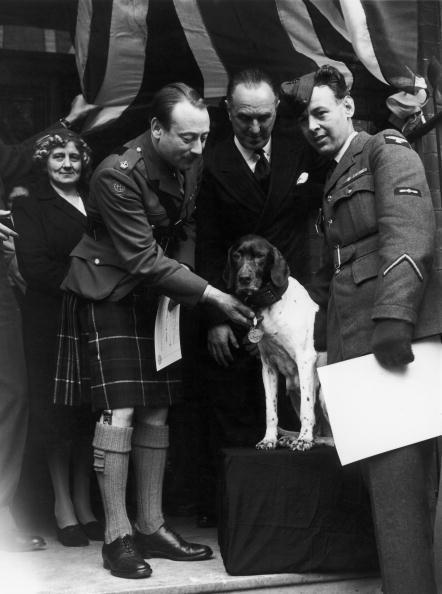November 5, 2020
Meet Judy: War Hero, Prisoner of War — and an English Pointer
Judy, an English pointer, was born in Shanghai in 1936, in the lead up to the Second World War. She became a mascot on the gunboat HMS Grasshopper stationed at Singapore. When the Japanese took Singapore in early 1942, Grasshopper headed for safer waters, but before the gunboat could reach safety, Japanese bombers attacked and sunk her.

Judy survived the sinking of Grasshopper, along with many sailors, but the dog and the men ended up marooned on a small desert island without food or water. Judy, however, sniffed out an underground freshwater spring and saved the group.
The British sailors managed to escape the desert island and reached Sumatra. The men, with Judy in tow, hiked over two hundred miles through the jungle — a journey taking five weeks. On the trek, Judy alerted the men to a tiger that was stalking them. When they finally made it out of the jungle, they had missed the British evacuation boat and ended up in a village under Japanese control. Japanese soldiers captured the sailors and brought them to a prisoner of war camp with Judy hidden in a rice sack.
The now-prisoners were moved between camps, finally ending up in the Gloegoer Camp, where they would be subjected to years of torture, deprivation and brutal forced labor.
The prisoners would feed Judy scraps of rice and maggots they found in their food. Whenever the Japanese guards started beating one of the prisoners, Judy would jump in, snapping and snarling to try to protect the prisoner. The guards would turn their anger on her, kicking her and beating her with the butts of their rifles.
Worried that guards would kill Judy, the British sailors hatched a plan. The commandant of the camp was a notorious alcoholic, but pliable when inebriated. One night, when the commandant was heavily drunk on sake, a sailor persuaded him to register Judy as a camp prisoner and Judy thus became the only animal in the Second World War to be registered as an official prisoner of war.
Judy provided a psychological boost for the men. Her happy presence and wagging tail helped to keep morale up in a terribly depressing and bleak environment.
In June 1944, the prisoners were transferred onto the ship Harukiki Maru. Within weeks, a bombardment of torpedoes collided with the ship and as the ship started to sink, the prisoners pushed Judy into the ocean before making their own escape. Over five hundred people drowned, but Judy survived. She also had helped save drowning men by directing them to floating debris they could cling to or by allowing them to hang on to her while she swam.
Sadly, she and the other survivors were recaptured and sent to yet another prison camp. In the new camp, the men were forced to work long, grueling hours cutting a track through the jungle. Judy proved her value once again by alerting the men to the presence of dangerous animals like snakes, tigers and elephants.
The prisoners were freed when the camp was liberated in early 1945. One sailor took Judy back to the UK with him, where she was greeted with a hero’s welcome. She was awarded the Dickin Medal in May 1946.
Judy stayed with the sailor for the rest of her life. She died of cancer in 1950.
Judy’s story is amazing, but true. This Remembrance Day, along with our human heroes, let’s remember animal heroes like Judy.
Bruce Roney
President & CEO
